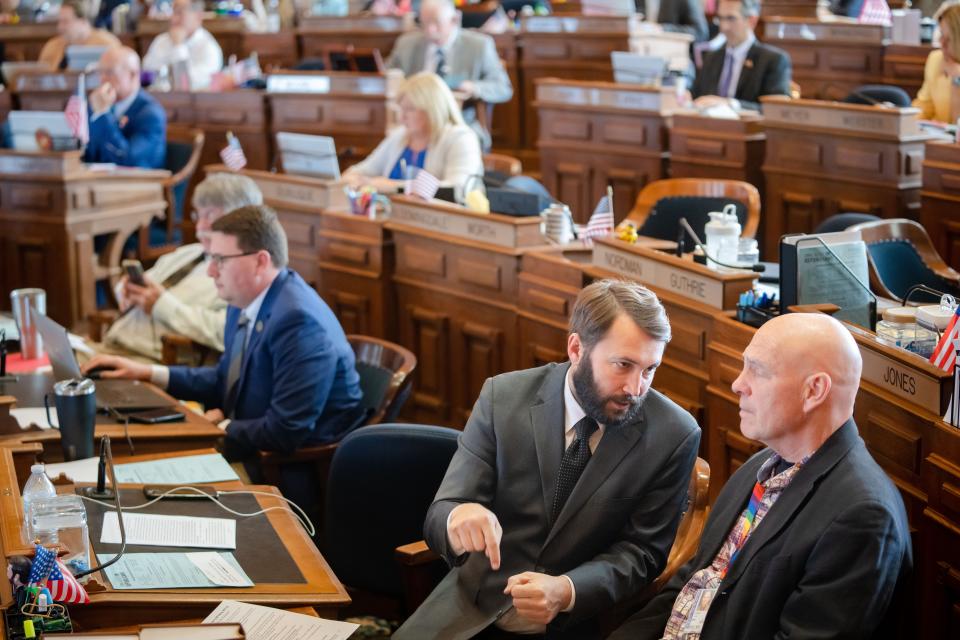Iowa lawmakers vote to pass $100M property tax cut, with breaks for seniors, veterans
- Oops!Something went wrong.Please try again later.
Iowa lawmakers voted nearly unanimously Tuesday to pass sweeping property tax cuts that will rein in local governments' revenue growth and provide new tax breaks for military veterans and seniors.
Legislative Republicans struck a deal on Monday and moved swiftly to pass it. The Senate voted 49-0 to pass House File 718 on Tuesday morning. The House followed a few hours later with a 94-1 vote, sending the bill to Gov. Kim Reynolds for her signature.
Iowans have seen skyrocketing home assessments this year, and lawmakers have said their goal is to keep those growing assessments from turning into dramatically higher tax bills for homeowners.
"The old days of local governments getting an assessment windfall and leaving your levy rate the same are over," said Sen. Dan Dawson, R-Council Bluffs, the bill's Senate floor manager. "If valuations rise, your levy rate will fall. What we do here today changes the entire dynamic of our property tax discussions here in this state."
Republican legislative leaders estimate the legislation will result in a $100 million property tax cut statewide.

Democrats also voted overwhelmingly in favor of the bill. Sen. Pam Jochum, D-Dubuque, said Iowans have been asking lawmakers to address property taxes for years.
"After several years of tax cuts that benefited corporations and higher income earners in Iowa, we are finally addressing a tax system that is one of the two more regressive taxes in our state tax code," Jochum said.
Rep. Elinor Levin, D-Iowa City, was the lone no vote in either chamber. She said her constituents have told her they want property taxes to be simpler and lower.
"While this may lower property taxes for a small percentage of Iowans, it also makes our property tax code much more complicated and hurts local communities and schools," Levin said in a text message. "For those reasons, I cannot support it."
Cities and counties would have to use excess revenue growth to lower property tax levies
A central feature of the bill would limit how much money cities and counties can take in each year and require them to channel excess funds into lowering property taxes.
The bill divides cities and counties into three tiers, based on whether their revenue grows by less than 3% annually, between 3% to 6% or above 6%.
And it establishes a new formula that requires local governments to use a portion of the excess growth to reduce property taxes to bring them back to maximum tax levy levels set in Iowa law.
If a city or county's revenue does not grow, it would not need to reduce its levy.
"I am proud to add yet another historic accomplishment to protect the taxpayer,” Senate Majority Leader Jack Whitver, R-Grimes, said in a statement. "Iowans feared big property tax increases with their new assessments. This bill fixes it."
For cities, the bill consolidates 15 individual tax levies into a general services levy for that city, which is capped at $8.10 per $1,000 in taxable value.
For counties, the county general services levy is capped at $3.50 per $1,000 in taxable value, and the county rural services levy is $3.95 per $1,000.
While several individual tax levies are being consolidated, cities will still retain some separate levies, including for debt service, pensions, transit systems, aviation authorities and tort expenses, that don't count toward their general fund levy limitation. Counties also retain some separate individual levies in addition to their general levy.
"I do believe that — although we are slowing growth down to some extent — I still believe local governments are still going to be able to address the most essential services at the local level," Jochum said.
The mechanism for using excess revenue growth to lower property taxes will sunset after four years unless lawmakers take further action.
Iowans have been receiving new property tax assessments in the mail this spring. The taxes on those assessments won't be due for another 18 to 24 months. By then, Republicans expect the new limitations to blunt the growth of those tax bills.
Current law already contains a mechanism called the "rollback" rate, which is an adjustment the state makes to hold down taxes by limiting the annual growth of property assessments on a statewide basis.
Seniors and military veterans will receive new property tax exemptions
The bill passed on Tuesday provides an additional $6,500 homestead property tax exemption for Iowans 65 and older. And it more than doubles a property tax exemption for veterans by increasing it to $4,000 in taxable value.
"Over 200,000 senior citizens here in Iowa are going to see direct relief on their bills. That’s a good thing," Dawson said. "Over 100,000 veterans are going to see relief. That’s a good thing."
Senate Republicans previously estimated that those two changes will result in $57 million in property tax relief.

Republicans said they intend to return next year to make more changes to Iowa's property tax system.
"For all Iowans, the foundational changes that we’re making make this a big deal and what I’m going to sit here on the floor today and say is phase one of bold property tax relief," said Rep. Bobby Kaufmann, R-Wilton, the bill's House floor manager.
Bill contains some provisions to help cities and counties raise revenue
Cities and counties would also gain new options for assessing fees as a way to provide alternate revenue streams.
Those fees would include a $10 convenience fee that counties could charge when issuing or renewing a driver's license to nonresidents who choose to renew their license in that county. County recorders would also be able to charge a $2 registration or renewal fee for boats, ATVs and snowmobiles, up from $1.25.
The bill would also increase the spending thresholds that trigger a bond election, allowing cities and counties to spend 30% more than they can currently before they have to take the project to voters for approval. The spending thresholds were last raised 30 years ago, lawmakers said.
The bill also contains new requirements for transparency in property tax bills and would require bond elections to be held at the same time as general elections.
The legislation will stop school districts from future votes to approve a Public Education and Recreation Levy, or PERL, which is used to pay for things like playground equipment, after-school programming and adult education. The levy will remain in place for the 29 districts where it was approved by voters.
More: DART is losing millions. Are bus route service cuts or tax hikes needed to save it?
The Des Moines Area Regional Transit Authority, or DART, will be given new options to raise money by imposing a franchise fee of up to 7.5% and using the new revenue to lower property taxes.
A franchise fee is charged to electric, gas, cable TV and other systems, allowing them to use public streets and alleys to provide service within the city.
Under the bill, the cities would be required to use any franchise fee revenues above 5% to reduce their property tax levies that fund their transit systems. Only Des Moines would qualify.
Stephen Gruber-Miller covers the Iowa Statehouse and politics for the Register. He can be reached by email at sgrubermil@registermedia.com or by phone at 515-284-8169. Follow him on Twitter at @sgrubermiller.
This article originally appeared on Des Moines Register: Iowa Legislature approves final passage of $100M property tax cut

